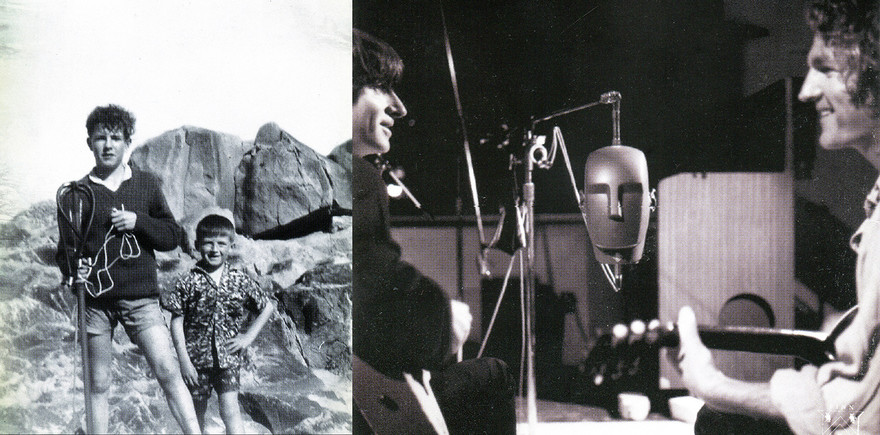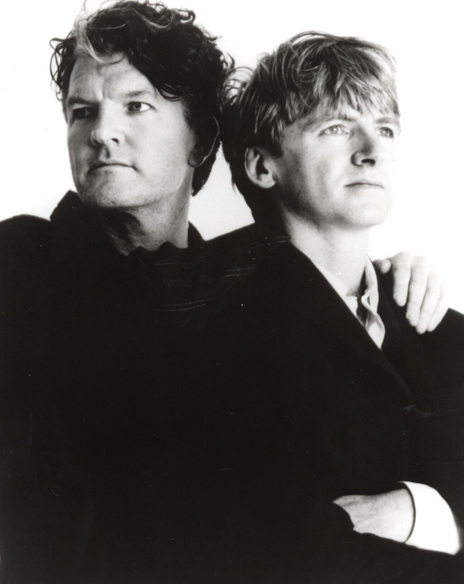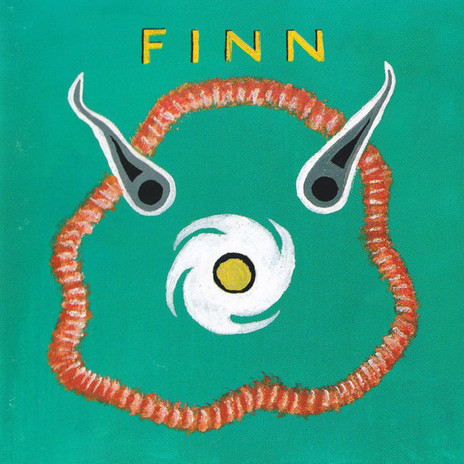
Photos of the Finn brothers from inside the 1995 album 'Finn'. The studio shot was taken by Darryl Ward at York Street during the sessions; it shows the Neumann KU100 dummy head binaural recording microphone used by producer/engineer Tchad Blake.
MELBOURNE, February 1996 – As An Evening with the Finns draws to a close at the Dallas Brooks Hall, the brothers take a break from making music together and the lights fade to black. A projection screen is carried out: it’s home-movie time, with a commentary by Tim and Neil. The faded colour of the flickering Super-8 footage shows images from an idyllic late-50s childhood: kids with hula hoops, paddling pools, pet lambs and pedal cars.
Then comes a production number. It’s a nativity scene, carefully choreographed by a Te Awamutu director with Cecil B DeMille aspirations. All the neighbourhood children walk by in formation, with towels on their heads, their hands in pray; they present gifts to the Holy Family.
Tim takes up the narration. “That’s our sister Carolyn, playing Mary,” he says. “There’s me: I’m Joseph. And here comes Neil, as baby Jesus.” The audience swoons; they’re loving this nostalgic romp by their adopted sons. “Ah, Neil,” asks Tim, “how come we’ve got all the lead roles?”
Performing for their family during Christmas parties at the beach was where it all started for the brothers Finn. They would rehearse in the hallway, then knock out the relatives with a version of ‘Jamaican Farewell’. “Our Uncle George would insist,” says Neil. “So we’d get dragged out. And though we’d squirm with embarrassment, we’d really enjoy it.”
Says Tim, “We used to be forced into it. Good naturedly, but definitely forced. And I guess Neil was sheltered by me. It’s easier to be a lieutenant or a younger brother. You give the natural authority to the older brother, and just tag along.”
Later, when Tim started putting bands together at school, Neil would hang about to watch. Despite the six-year age gap, he would occasionally be allowed to sing. “He was just good to have around,” says Tim. “Neil was always pretty cool. He knew how to be around older guys. To most people, it’d be, ‘Oh God, here comes my younger brother – I’ve got to look after him for the afternoon.’ It wasn’t like that.”

Tim and Neil Finn, 1995 - Koji Kumada Collection
By 1976, Split Enz was New Zealand’s leading local band, filling town halls throughout the country. Tim invited Neil along as the support act on a national tour. He was 17, and just out of school. “He was a pretty fearless performer,” says Tim. “I remember how gutsy he was at that age, to play not just covers, but his own songs, in front of 2000 people. Neil always felt that being on stage was a natural space to inhabit. I don’t think he went through that blind terror that I went through. Of course he had his own inherent courage, but he also had a blueprint.”
And talent. Reviewing that early tour for the Christchurch Press, Jude Fahey declared: “I would like to get it on record now that Neil Finn is a singer of great potential. Timothy’s 17-year-old brother sang and performed his own material along with two or three Lennon-McCartney numbers. The standard of both lyrics and tunes was astounding. Brother Timothy considers him a born performer and adds, ‘I don’t believe in performers necessarily making it just on their own merits. If I can help him I certainly will.’”
Since then, their fortunes have been as interwoven as DNA. The next year Tim called his parents from London, asking if Neil could join Split Enz. Two members had quit, but things got worse. The band was at its lowest ebb when Neil wrote ‘I Got You’. It was an international hit. (“Basically, he saved my arse,” Tim said in 1984.)
However, it has worked both ways. Neither career was in the ascendant when the pair sat down to write songs together, for the first time, in October 1989. The resulting collaborations, full of hooks and harmonies, were requisitioned for Neil’s band Crowded House and brought them back to worldwide prominence. Neil then recruited Tim for the band, but it didn’t work out: like Princess Di’s marriage, it was getting mighty crowded.

Finn (Parlophone/EMI, 1995)
Now, Enz have finally met with the release of the brothers’ first album as a duo, Finn, and the accompanying concert tour. After playing England, Ireland and Australia, An Evening with the Finns reaches New Zealand this week. It’s been “a novelty and a joy”, says Neil. “We wanted to do New Zealand before we kissed off the record.”
Compared to the fastidiously crafted albums of Crowded House, Finn is a relaxed, spontaneous affair. If the walls could talk in the family home in Te Awamutu, Finn is the album from the boys’ bedroom. It captures a childhood spent playing acoustic guitars together, working out a few chords after a Beatles session on the radiogram. The songs are like works in progress, an insight into the brothers of invention.
Once again, there are hooks and harmonies, sometimes with a languid feel that Neil describes as Pacific kitsch. “I wouldn’t make any grand claims for it being rootsy or authentic. It’s the kind of Pacific that us white Tee-ahmutu boys probably first associated with, a nod to that nostalgic view: Bali Ha’i, shell mirrors and all that. It’s valid for us, it’s what we grew up with.
“I don’t want people to think this is a bit of a dabble before I get back to the real stuff,” says Neil. “This is part of a continuum, and we’re very pleased with it.” He says the record has been 37 years in the making; his brother agrees: “It came from a long way back.”
“It was pretty effortless, I think we’ve been making it for quite a while,” says Tim. “But I think people expected that, when we finally got around to making a record, it would be the great summing up, the Finn Brothers. It’s not like that, it’s just what was there at the time. People ask, were you aware of the expectations? We weren’t, we were just off in our private space, making it.”
For Neil, the project is also a chance to take control of a career that often seems to have its own momentum. “We wanted to mark out some time for this, it seemed important. We didn’t tell anyone, we just went and did it. We had very modest expectations for it.”
More expectant of the record than most were Dick and Mary Finn, who from the beginning have assiduously followed their sons’ progress, tracking their albums in the charts, even marking them all out of 10. “Oh yeah, the ratings system,” says Tim. “It’s become ridiculous. Dad started to give a few things sevens or eights, and it was always a bit depressing. Now the minimum is 10, and if it’s really good you get a 13. It’s a very Irish marking system.
“Those kind of simple things really affect us, what our cousins think, or our nephews and nieces. If there’s just this towering silence, you just swallow hard and go and make another record. [My parents] were probably expecting a few more harmonies. Because when they think of Neil and me singing together, it’s woolshed parties, with two acoustic guitars, doing lots of harmonies.”
Finn is also an opportunity to lay to rest misconceptions about Tim’s brief tenure in Crowded House, when it was found that an extra frontman upset the balance of the close-knit trio. “People always suspect that there are some darker forces working than there really are,” says Neil. “In almost every way, the Woodface thing was a success. The one thing that didn’t work out was long-scale touring. It didn’t feel comfortable in that context. But this is an opportunity to do it in a more pure way, without those pressures. Tim didn’t really need to join Crowded House, he could have come on the road and jumped on stage at any time. It would have put a lot less pressure on the situation.”
One of the songs Neil wrote for Woodface was called ‘Fame Is’ (“in your blood”). The Finns seemed to have weathered New Zealand’s traditional tall-poppy harvesting. “I’m grateful for the fact that I can go to most places in New Zealand and be able to connect with people,” says Neil. “In general, New Zealand people aren’t particularly gushy anyway, which is nice. Otherwise, I might find it more intimidating. If they say hello, it’s ‘great music mate, what ya doin’, havin’ a holiday?’ I don’t think people are overawed by fame. New Zealand is a slightly perverse place. Like, so far we’ve only sold 200 tickets in Hamilton – and we think wow, this is our home town. It doesn’t ever pay to take it for granted that New Zealanders will swarm to whatever we do.”
Being well-known isn’t all positive, says Tim. “You meet some pretty narky types. It’s a funny thing about New Zealand, I can’t work it out. It’s a shame we don’t celebrate our own more. I don’t mean me, I’ve had plenty of accolades. But still, no one runs around patting anyone on the back.”
He laughs about an incident on a recent holiday here that seemed to sum it up. “I swam across this lake, feeling really heroic because I’d had a fractured ankle and I was just out of the cast. So it was this useless thing dangling along behind me. I felt really great about it. I got to this little promontory on the other side, and there was no one there except this one guy who’d obviously done the swim as well. And I was scrambling up the rocks, pathetically waving at him, seeking camaraderie or ‘good on ya, mate’. He just squinted into the sun and said, ‘It’s gonna be even harder on the way back.’”
The mood is buoyant on the way to the Melbourne concert. The city was home to Neil Finn for well over decade before his move back to New Zealand. Now, when visiting, he has to stop himself driving back to his old house in South Yarra rather than the hotel. Both Melbourne shows are sold out, and news has just arrived that Finn has gone from 35 to 22 in the Australian charts. It gives the whole entourage a buzz. Neil has a bunch of flowers in his lap; it is his 14th wedding anniversary, and his wife Sharon has been designing the lights in the hall while he has had a gruelling tennis match with Paul Kelly. (Neil lost 7-5, after being behind 4-1.) Meanwhile, Tim has been swimming, at the ornate Victorian city baths rather than his favourite pool, the Harold Holt (memorial to the PM who drowned).
The irony isn’t lost on him, nor is the fact that these former convent schoolboys have chosen to play in a modern Masonic hall. Hanging in the foyer above the stalls of Finn merchandise are oil portraits of Masonic stalwarts, resplendent in aprons, medals, chains, gauntlets and waxed whiskers. Tim Finn has an affection for the austere concrete barn; Split Enz made an impact in the venue on its first foray into Australia, over 20 years ago. (“It’s good of the Masons to have us back,” he says during the show, giving a quick goat-symbol salute from behind his drum-kit.)
The evening is like psychedelic cabaret, the familiar melodies interrupted by spontaneous comedy.
The evening is like psychedelic cabaret, the lasers spotlighting the Finns’ boarding-school suits, the familiar melodies interrupted by spontaneous comedy. The brothers have an easy rapport with an audience that ranges from T-shirted teenagers to grey-haired Frenz of the Enz. Requests range from the ancient ‘Late Last Night’ (“You’ll be lucky – too many chords,” says Neil) to the recent ‘Private Universe’ (Neil teaches Tim the chords). In tribute to their bass player, Dave Gent (“I’m the Māori in a suit”), they whip through a medley of the Exponents’ greatest hits.
The Finns’ banter goes back and forth like Pete and Dud; they mock their music, their past, even their relationship with each other. It’s self-deprecating, but also self-aware. A light-hearted bout of the inevitable brotherly oneupmanship breaks out. Neil knows he has lost when Tim says: “I was being ironic, Neil.”
“I should have known after all these years,” Neil replies, turning to the audience: “We enjoyed that. There’ll be more later – we’ll take requests.” He dedicates a song to his wife, explaining the anniversary. With the home movies and intimate family jokes, the brothers skate between their private and public lives, flirting with the audience’s desire for revelations.
Tim announces the final number: “Here’s a song to celebrate Neil and I getting together to indulge ourselves. Thanks for letting us.” Ringing out above punchy acoustic guitars, the spirited harmonies are unique to siblings; it could be the Everly Brothers. But it’s the Finn boys back at the woolshed party, with their strongest collaboration off Woodface: ‘It’s Only Natural’.
--
This article first appeared in the NZ Listener, 2 March 1996, as ‘Brothers of Invention’, and is republished with permission of the author. The Finn album was re-released in 2022 on vinyl by Needle Mythology, with an extra album of the Finn brothers’ demo sessions of 1989. In the liner notes, Radiohead’s Ed O’Brien praises the album’s “heavy” beauty and its “elemental energy.” UK music critic Pete Paphides was involved in the vinyl release and interviews the Finn brothers here.